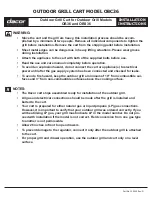
3
b.
Wiring one RH-250 and one RH-253 single pole
momentary switch for multi-way Manual-ON/OFF single
load control.
IMPORTANT:
The RH-250 must be installed in the wiring wall box that
connects to the load.
• Connect the green or non-insulated (copper) GROUND wire
in each wiring box to the green terminal on each RH-250 and
RH-253.
• Connect the NEUTRAL wire from the circuit and from the
lamp (LOAD) to the white wire on the RH-250.
• Connect the power wire from the circuit box (HOT) to one
terminal of the RH-253 single pole momentary wall switch
and to the TRAVELER 1 wire.
• Connect the TRAVELER 1 wire coming from the RH-253
wiring box to the black wire of the RH-250.
• Connect the lamp power (LOAD) to the red wire on the
RH-250.
• Connect the TRAVELER 2 wire to the other side of the
RH-253 single pole momentary wall switch and to the yellow
wire of the RH-250.
5.
Put all the new switches into their wall boxes.
Position the RH-250 switch(es) with the lens above the ON/OFF button
(lens at top, ON/OFF button at bottom). Use the captive screws on the
mounting strap to secure the switches to their wall boxes.
6.
Restore power to the circuit.
Turn on the breaker or replace the fuse.
7.
Make any necessary adjustments.
See the SENSOR ADJUSTMENT & PROGRAMMING section
for information.
8.
Install cover plates.
Install industry standard decorator wall switch cover plate (not
included)
Initial Power-up
There is an initial warm-up period. If the sensor is in Mode 2 “Automatic
ON” it may take up to a minute before the lights turn ON. However,
the lights can be turned ON/OFF manually by pressing the “ON/OFF
Button” at any time when power is supplied to the unit.
SENSOR ADJUSTMENT & PROGRAMMING
To program the RH-250, you use controls located under the ON/OFF
button. The wall switch cover plate must be removed to gain access to
the mode button and adjustment trimpots under the ON/OFF button.
1. Firmly grasp the side edges of the Lock Bar and gently pull it
away from the switch face until it clicks. Do NOT attempt to pull
the Lock Bar off of the switch!
2. Firmly grasp the side edges of the ON/OFF button. Slide the
button downward approximately 1/2 inch to expose the mode
button and adjustment trimpots.
For multi-way operation, the Operating Mode and the Time Delay
adjustments should be the same in all sensors related to the same
load.
Setting up the Operating Mode
Select the operating mode by pressing the Mode button. The amber LED behind the switch button blinks to indicate the selected mode. The
blink pattern repeats three times:
• One blink indicates Mode 1 (Vacancy Sensor Operation), Manual-ON/OFF, Auto-OFF
• Two blinks indicates Mode 2 (Occupancy Sensor Operation), Auto-ON/OFF with manual control and reset to auto (after 5 minutes of
vacancy)
To change the mode, press the Mode button once to set the unit to mode 1 or press the Mode button twice to set the unit to mode 2. The LED
blinks to indicate the selected mode. It repeats the selected mode three times. After that, the unit operates in the indicated mode.
Adjusting the Time Delay
Turn the right trimpot counter-clockwise to reduce the amount of time the lights will remain ON after the last motion detection (minimum = 15
seconds). Turn the same trimpot clockwise to increase this time delay (maximum = 30 minutes). You can only select the following values: 15
seconds/5 minutes/15 minutes/30 minutes.
Warning: Do not overturn the Time Delay adjustment trimpot!
RH-250
Red
Ground
Yellow
Black
White
Load
Traveler 2
Hot
Neutral
Traveler 1 (Hot)
TOP
INDOOR USE ONLY
RH-253
Ground
RH-253
Ground
Ground
Traveler 2
Traveler 1
Traveler 2
Traveler 1
Traveler 2
Traveler 1
120V/60Hz
AUXILIARY RH-250
MASTER RH-250
TOP
INDOOR USE ONLY
TOP
INDOOR USE ONLY
Red
Ground
Yellow
Black
White
Red
Ground
Yellow
Black
White
Load
Traveler 1
Traveler 2
Neutral
Hot
120V/60Hz
Neutral
Fig. 5 Step 4a. Reference wiring diagram
RH-250
TOP
INDO
OR U
SE O
NLY
L
L
Red – Load
(power to lamp
or fan)
Ground
Terminal
White –
Neutral
Yellow – Traveler 2
to RH-253
Traveler 1
to RH-250
Black-> Traveler 1
power via RH-253
RH-253
Line (power from
circuit box)
Traveler 2
to RH-250
Ground
Terminal
Fig. 6: Step 4b. Sensor orientation and wire connections for 3-way
operation with an RH-253 momentary wall switch
Fig. 7: Step 4b. Reference wiring diagram for multi-way operation with
RH-253 momentary wall switches (4 maximum)
To wire up to four RH-253 single pole momentary wall switches to one
RH-250, wire them in parallel as shown in the following wiring diagram.






























